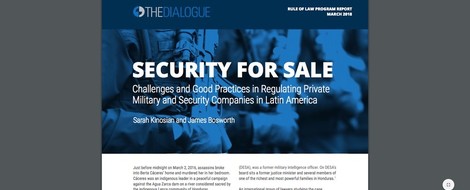Your podcast discovery platform
Curious minds select the most fascinating podcasts from around the world. Discover hand-piqd audio recommendations on your favorite topics.

piqer for: Global finds Deep Dives
Catalina Lobo-Guerrero is a freelance journalist and anthropologist currently living in Barcelona, Spain. For the past decade she has been working as an investigative journalist and correspondent in Bogotá, Colombia and Caracas, Venezuela where has written about politics, corruption, the armed conflict and violence. Her work has been published by The New York Times, The Guardian, El País and other smaller and independent media outlets in Latin America.
Security For Sale In Latin America
A recent report by the Inter American Dialogue, reviewed here by Insight Crime, explores the challenges and problems that private security companies are posing to the most violent region in the world.
High levels of crime and insecurity, gangs, organized crime, corruption and ineffective police and military forces have all contributed to a rapid increase of the private security industry in many Latin-American countries in the past years. According to the report, there are more than 16,000 private firms that employ more than 2 million people.
In most countries there is a lack of oversight and regulation. Some of these firms have been involved in human rights abuses. One notorious example the report highlights is the case of Bertha Cáceres, an environmental activist in Honduras who was murdered in March 2016.
Other companies are involved with organized crime and arms trafficking. In El Salvador, for example, 40 percent of illegal fire arms have been linked to some 500 private security companies.
Most countries have laws and institutions that, in theory, should be monitoring and controlling this industry. But in practice many of the companies are operating without a licence or official registration. In Mexico, about 8,000 firms — twice the number of those that are compliant with regulations — are believed to be operating without prior authorization. This sector has grown 180% since 2012 and is now worth $1.5 billion.
Another common issue in many of the countries studied is that there is an overlap between private security and public security. Military or police officers work for both. At times, armed forces have worked for private contractors. Other times, private firms have been hired by the governments to supply specific services. Some overlaps are legal and some are illegal.
